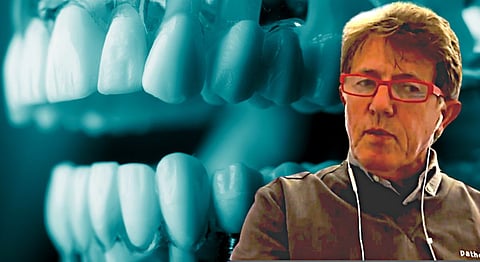“Dentists have been marginalised to bottom feeder status” – Dr Pieter van Rooyen on the implications of SA’s medical scheme set-up
For decades, dentistry has been regarded as one of the better paid professions. However, this assumption, largely maintained with reference to rising costs for dental work, is inaccurate. Even a cursory glance at the distribution of healthcare benefits paid in 2020 (see graph below) refutes this assumption. In 2020, of the total amount paid by South African medical schemes to service providers, a mere 2% was paid to dentists. To discuss the medical scheme set-up in South Africa and the way in which this unique 3rd party funder system has marginalised the dental profession, BizNews spoke to Dr Pieter van Rooyen, a dental surgeon and co-owner of Patheodent. With particular reference to Discovery Health's exorbitant administrative and managed care fees, Van Rooyen shed light on the drastic decline in the dental profession's standing. – Nadya Swart
Excerpts from the interview with Dr Pieter van Rooyen
Dr Pieter van Rooyen on South Africa's unique medical scheme set-up
In South Africa, we have a medical aid scheme, whereas most countries, as far as I know, have insurance-based [schemes] and national health and government supported ways of treating people, which is funded by a tax base and so forth. In South Africa, we've got a third party funded scheme run by private business, and they're in the business for their business, not for our business. They have a code system of their own. The rest of the world is on a thing called ICD-10 coding, but we happen to have the BHF, the Board of Healthcare Funders, and they've got their own coding system.
So, in your practice, apart from a huge admin burden to a practice, you have to report two codes for everything that you do. That has an effect on your staff, it has an effect on what it costs you to run your business, and it's just not necessary. You can run on an ICD-10 system like the rest of the world. In Cape Town, where we practise, we see a lot of international people and we generally only report ICD-10. Why should we report a second system purely to try and justify what you do?
This scale of benefits system, which is the fee instituted by this third party system – which I say is fairly unique to us – almost forces you to be what we used to call in the old days "contracted in".
On the marginalisation of the dental profession
If you're not registered with the Board of Healthcare Funders, you will just not be paid. End of story. And believe me, I've been on the other side before, so I understand the pains that approximately 80% of dentists are still going through today. And it's not easy to change because we're a small group of guys practising in this country. And the third party funder system is huge. I mean, you're up against insurance businesses, you're up against banks, you're up against people with a lot of clout and marketing. And also, someone who pays monthly into that system believes that system.
The dentistry profession is a small group of people. It's easy to marginalise, it's easy to manipulate. Internationally, you have dental insurance. We don't have dental insurance here. You have this benefit scheme, and it's easy to cut the industry out. In my view, I don't think that the funders, or the people that deal with this, regard this as an essential thing.
Before 1990, it was very different. In the nineties it started changing dramatically. Incidentally, I started practising in 1990, so it's a good comparative time. In the good old days someone had a R10,000 or a R15,000 benefit. You could do some work for them, you could do some real proper dentistry. And now some of these guys have one consultation per year at a rate that is determined by these third party funders, not by a rate that is actually the real cost to the practice with some profit.
In 1990, if you were a doctor or dentist or whatever qualified person, you were a well-respected member of your community. Today, you're a bottom feeder. Nobody cares anymore. People have got no more loyalty. "Where am I going to get the best deal?" That's what it's all about. People don't care. And that's a complex, complex social construct that's happening all around us. So, for a small group of professionals to go and try to compete against these big guys is impossible.
On the medical aid schemes in South Africa purporting to be not-for-profit organisations
There's this issue that medical aids are supposedly not profit making or nonprofit organisations, and it's a big question.
We know that medical schemes, not administrators, are supposed to be nonprofit. And the medical scheme is supposed to have a certain reserve, which is burdened upon them by the government. This is understandable, because you need to cover the costs that you're dealing with. You're taking people's money. There's a risk in this business model. So, it's fair to say, "Listen, guys, you can't take on members and have nothing there. What do you do with their money?" I understand that. And I'm not saying that's not fair.
What I'm saying is not right is that I personally don't understand the difference between growing your funds or your surplus or whatever you have and profit. If I grow my value then I'm surely making a profit, am I not? So, maybe because I'm totally financially inept, I don't understand those things. That's possible. But it's difficult to say, "Oh, no, we grew our reserves by so much." Explain what it means. Explain what it means to the average Joe so he knows where his money is going. You've grown your surplus and, to me, that means you've made money. You've made money. End of story.
Read also:

